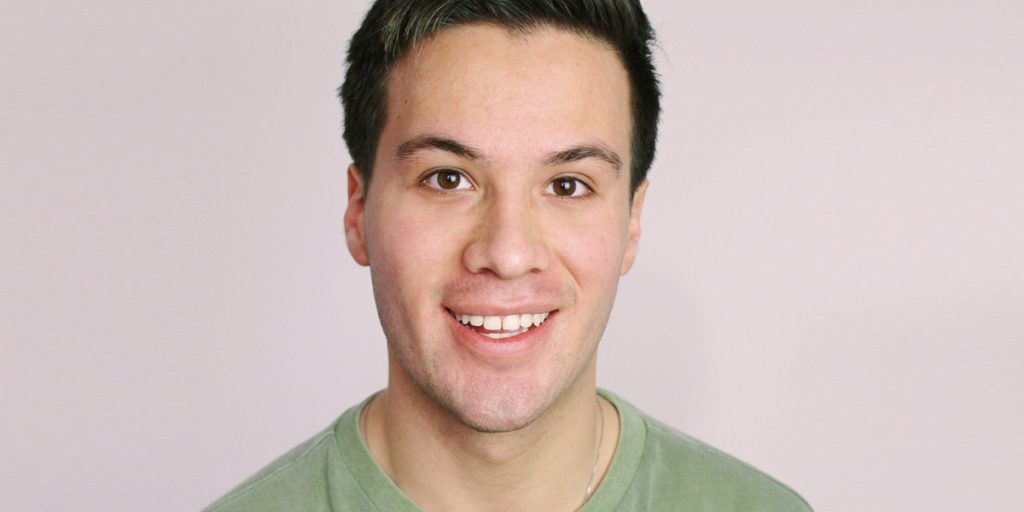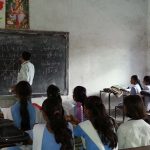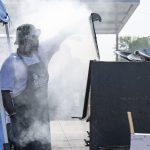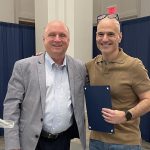Nicholas Crookston is a sophomore enrolled in the Keough School’s supplementary major in global affairs, with a concentration in civil and human rights. He is vice president of the Latinx Student Alliance and serves as a Diversity, Inclusion, and Gender Relations Commissioner for Siegfried Hall.
It’s important to me that my efforts be tailored towards speaking truth to power, uplifting marginalized voices, and defending human dignity against prejudice, abuse of power, violence, and neglect.
Can you talk a little about what led you to your interest in civil and human rights?
I am the proud son of a Colombian immigrant mother, a Black American man who I know and love as my Dad, and the rest of a large, multiethnic, multiracial village of grandparents, aunts, uncles, and other family and friends that raised me. All that I am, and all that I am becoming, I owe both to the love of those people who sacrificed so much to bring me up and, above all, to the greatest possible love of God, from whom all of these blessings flow. And I consider it a duty and responsibility to take that inheritance of love and pay every ounce of it forward, in service to others.
Beyond this inheritance of love and my vocation to pay it forward, these truths of my life have cultivated in me a richness of perspective and a strong passion for justice. I, and the rest of my generation, came of age amid both an intense expansion of technological interconnectivity and an amplified awareness of inequality and injustice in the world. Together, we’ve witnessed widespread unjust treatment of migrants, police brutality, institutional racism, the climate crisis, among other widespread neglect of human dignity. And, as most have, I remember witnessing these events from a young age and asking so many questions about them. And, for me, those questions were intensely personal: How would my immigrant mother’s story have been different had she not found family and friends gracious enough to advocate for her pursuit of the American Dream, in this country where Latino immigrants and refugees are, so often, met with largely insurmountable barriers to legal status and unjust treatment by immigration law enforcement? What if my Dad, or one of my younger siblings, or any other member of my Black American family were to, one day, fall victim to the violence of racist police brutality? And why are we not talking about the fact that black and brown communities are bearing the greatest brunt of the ever-intensifying climate crisis?
I have always taken such questions of justice seriously, because I take them personally. Because, in the faces of those most affected, I can’t help but see my family and its own experiences with xenophobia and racism. As a child, I felt a pressing demand for explanations for what I was witnessing. As a teenager, I would think about these things until my head hurt. And, as a young man, I wanted to speak out, and learn what role I might play in the fight against injustice. These questions have played, and continue to play, a fundamental role in cultivating a personal passion for civil and human rights.
Outside of the Keough School, you’re active across campus in initiatives aimed at addressing injustice or bolstering representation. Can you discuss this a bit?
It fills me with so much hope and joy to work alongside some of the most engaged, passionate, and inspiring people across a variety of organizations, groups, and initiatives both on- and off-campus.
As vice president of the Latinx Student Alliance, I am grateful to serve on the board of one of Notre Dame’s largest Latino student organizations. Much of LSA’s work, this year, has been in building and sustaining our community during the pandemic school year, through events such as the upcoming Latin Expressions talent showcase, which I am honored to be co-directing. I have also stood alongside our board’s president, Isel Otero Torres, and other multicultural student leaders throughout the year in a series of critical discussions with University administration and student government about the well-being of Latino students and other underrepresented communities on-campus, as it relates to inclusion, campus policing, and representation.
I am also honored to serve as one of Siegfried Hall’s Diversity, Inclusion, and Gender Relations Commissioners. And—alongside other Hall leaders and our amazing Rector, Fr. Joe Pedersen—we have laid the foundations of an antiracism initiative in the Hall of Champions. Over the past year, I’ve helped to plan a series of events and workshops in Siegfried, geared towards discussing issues of racism in our community. We have also established a budding Rambler Diversity Council, set in place a no-tolerance policy for discrimination, and established a framework for holding Hall leaders accountable in maintaining and cultivating a just and inclusive community. And while I know we could have certainly done more this year, I’m proud of the people I’ve worked with and the progress we’ve made, and I’m excited to see how it is built upon in the years to come. Further, I am active with Student Government, the ND Diversity Council, and the Balfour-Hesburgh Scholars Program. Off-campus, I have also done work with the South Bend hub of the Sunrise Movement, engaging with the fight for climate justice in the local community and my beloved Hoosier State. And, more recently, I have been working over at La Casa de Amistad, a fantastic organization that serves South Bend’s immigrant and Latino community.
I’ve been amazed by the Keough School’s intensely interdisciplinary nature. In countless ways, my peers have graced me with their diverse breadth of passion, compassion, and wisdom.
Can you talk a little about your experience as a global affairs major at the Keough School?
The very first class that I stepped foot in as a Notre Dame student was Intro to Global Affairs and Integral Human Development, taught by Dr. Diane Desierto. And in that single class period, where we began to scratch the surface of what human dignity and the development of “each person and the whole person” might mean in reimagining questions of justice and equality, it dawned on me that the Keough School was exactly the place I needed to be.
Since then, I’ve been amazed by the Keough School’s intensely interdisciplinary nature. In countless ways, my peers have graced me with their diverse breadth of passion, compassion, and wisdom. While I bring developing political science and Latino studies backgrounds to the table, my classmates and colleagues provoke that thinking in countless ways with their insights from other areas such as art, culture, peace studies, economics, history, business, and architecture. And, in our class discussions and various projects that I’ve gotten to have a hand in, this dialogue has been fundamental in redefining how I look at the world and the issues that we must tackle together. Even further, the Global Affairs supplementary major and its CHR concentration, sponsored by the Klau Center, has brought me into the classroom of a host of brilliant minds—Dr. Desierto, Dr. Susan Ostermann, Dr. Matthew Hall, Professor Dory Mitros Durham, Dr. Bernard Forjwuor, and Fr. Emmanuel Katongole, to name a few. Overall, it is such an incredible blessing to be a member of the Keough School and Klau Center communities, and I am so excited to see where they lead me, next, in this great journey that I’m on at Notre Dame.
You’re enrolled in the Klau Center’s “Building an Anti-Racist Vocabulary” course. What has that experience been like?
Last week, one of my peers in “Building an Anti-Racist Vocabulary” said something along the lines of, “I literally cannot stop thinking about this class.” And, honestly, I couldn’t agree more.
As a student in the course, I have gotten to critically discuss the issues of racism in our country alongside a small group of remarkably engaged, humble, and inspiring peers, who come from a variety of backgrounds, perspectives, and places in life. Together, we’ve engaged with the works of Dr. Ibram X. Kendi and Ijeoma Oluo and moved topic-by-topic to discern the various ways in which racism appears in our lives, across the institutions that we participate in, and within the spaces that we inhabit. Further, we’ve been in deep, collective thought about how we, as individuals, might be strong and fervent antiracists and allies to our brothers and sisters of color, across the communities that we call home. I feel I’ve grown so much since beginning this class, thanks to the wisdom, honesty, and contributions of both my peers and our instructor, Professor Dory Mitros Durham.
In addition to class dialogues, this collective learning experience has been enriched with the wisdom of various guest speakers. I could go on and on about the incredible insights that I have taken from them, thus far, but I will just name a few. I was moved by the ways in which I could relate to Sunny Hostin’s discussion on how to navigate mixed, blended identities in a world that constantly tries to define, and sometimes exclude, you against your will. And I was further motivated by her testimony on her career as a prosecutor, and her call for people from diverse backgrounds to take seats on both sides of the legal arena, in the multifaceted fight to “[protect] the most vulnerable in our society.” I was fascinated by Wes Lowery’s work with the Fatal Force Project, and his commitment to bringing the attention of the world to the voices that are too often excluded from our discourse on racism. And I was moved by Frank Leon Roberts’ invocation of the wisdom of elders in the civil rights struggle, such as the late-great John Lewis, and his message regarding the “acknowledgment, action, and accountability” that must take place, on an individual level, when engaging in racial justice activism.
Where do you see your studies at Notre Dame leading you? What kind of effect would you like to have on the world, and where do you think you’d be best suited to effecting those changes?
Looking forward, I have my current gaze set on law school. With a Juris Doctor and a world-class undergraduate education at Notre Dame under my belt, I hope to get my boots on the ground, immediately, and take part in addressing the compounded legal battles for equality and justice in our communities. I haven’t quite decided what particular issue I’d like to engage with in that work, because I’m constantly thinking, a lot, about a variety of things—the fight for climate justice, the civil rights struggle for immigrant families and communities, the movement combatting institutional racism, and the battle for voter rights.
I have yet to pinpoint exactly what career field I might want to pursue. I could see myself as a prosecutor, a civil rights attorney, a judge, a community organizer, or, possibly, a lawmaker. Regardless of where I am and exactly what I’m doing, I know this: it’s my duty to do work that meaningfully pays forward the love of God and the village that raised me. And it’s important to me that my efforts be tailored towards speaking truth to power, uplifting marginalized voices, and defending human dignity against prejudice, abuse of power, violence, and neglect. As long as I’m doing that work, informed by my faith, and fighting a good fight in the communities that I love, I’ll know that I’m exactly where I need to be.
Originally published at klau.nd.edu.



